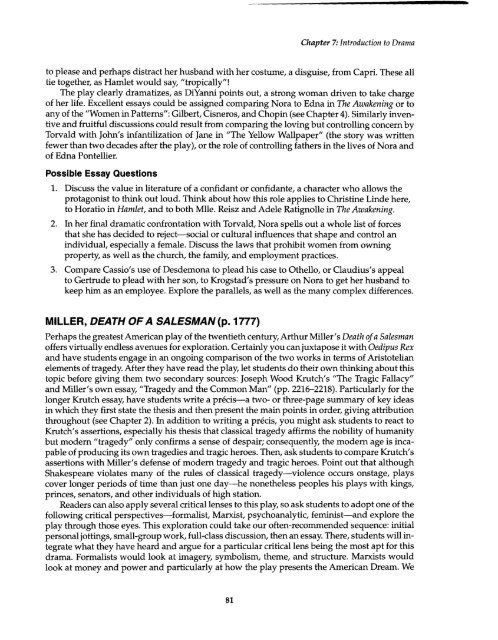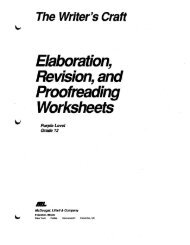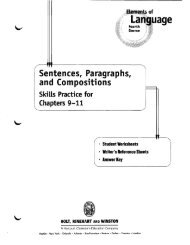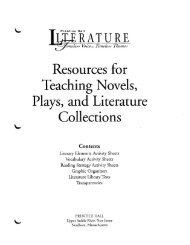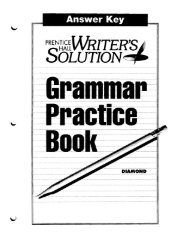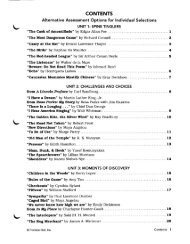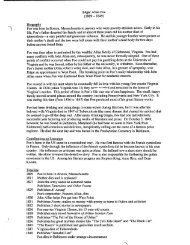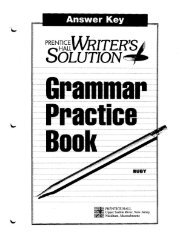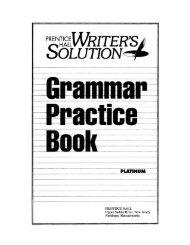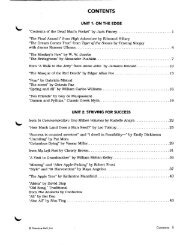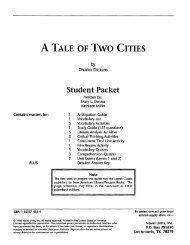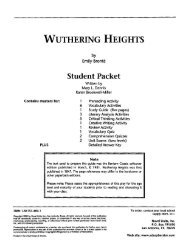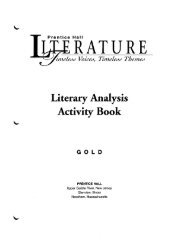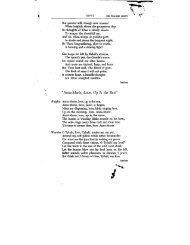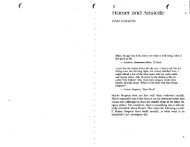English Literature & Composition - PopulationMe.com
English Literature & Composition - PopulationMe.com
English Literature & Composition - PopulationMe.com
Create successful ePaper yourself
Turn your PDF publications into a flip-book with our unique Google optimized e-Paper software.
Chapter 7: Introduction to Drama<br />
to please and perhaps distract her husband with her costume, a disguise, from Capri. These all<br />
tie together, as Hamlet would say, "tropically"!<br />
The play clearly dramatizes, as DiYanni points out, a strong woman driven to take charge<br />
of her life. Excellent essays could be assigned <strong>com</strong>paring Nora to Edna in The Awakening or to<br />
any of the "Women in Patterns": Gilbert, Cisneros, and Chopin (see Chapter 4). Similarly inventive<br />
and fruitful discussions could result from <strong>com</strong>paring the loving but controlling concern by<br />
Torvald with John's infantilization of Jane in NThe Yellow Wallpaper" (the story was written<br />
fewer than two decades after the play), or the role of controlling fathers in the lives of Nora and<br />
of Edna Pontellier.<br />
Possible Essay Questions<br />
1. Discuss the value in literature of a confidant or confidante, a character who allows the<br />
protagonist to think out loud. Think about how this role applies to Christine Linde here,<br />
to Horatio in Hamlet, and to both Mlle. Reisz and Adele Ratignolle in The Awakening.<br />
2. In her final dramatic confrontation with Torvald, Nora spells out a whole list of forces <br />
that she has decided to reject-social or cultural influences that shape and control an <br />
individual, especially a female. Discuss the laws that prohibit women from owning <br />
property, as well as the church, the family, and employment practices. <br />
3. Compare Cassio's use of Desdemona to plead his case to Othello, or Claudius's appeal<br />
to Gertrude to plead with her son, to Krogstad's pressure on Nora to get her husband to<br />
keep him as an employee. Explore the parallels, as well as the many <strong>com</strong>plex differences.<br />
MILLER, DEATH OF A SALESMAN (p. 1777)<br />
Perhaps the greatest American play of the twentieth century, Arthur Miller's Death of a Salesman<br />
offers virtually endless avenues for exploration. Certainly you can juxtapose it with Oedipus Rex<br />
and have students engage in an ongoing <strong>com</strong>parison of the two works in terms of Aristotelian<br />
elements of tragedy. After they have read the play, let students do their own thinking about this<br />
topic before giving them two secondary sources: Joseph Wood Krutch's "The Tragic Fallacy"<br />
and Miller's own essay, "Tragedy and the Common Man" (pp. 2216-2218). Particularly for the<br />
longer Krutch essay, have students write a precis-a two- or three-page summary of key ideas<br />
in which they first state the thesis and then present the main points in order, giving attribution<br />
throughout (see Chapter 2). In addition to writing a precis, you might ask students to react to<br />
Krutch's assertions, especially his thesis that classical tragedy affirms the nobility of humanity<br />
but modern "tragedy" only confirms a sense of despair; consequently, the modem age is incapable<br />
of producing its own tragedies and tragic heroes. Then, ask students to <strong>com</strong>pare Krutch's<br />
assertions with Miller's defense of modem tragedy and tragic heroes. Point out that although<br />
Shakespeare violates many of the rules of classical tragedy-violence occurs onstage, plays<br />
cover longer periods of time than just one day-he nonetheless peoples his plays with kings,<br />
princes, senators, and other individuals of high station.<br />
Readers can also apply several critical lenses to this play, so ask students to adopt one of the<br />
following critical perspectives-formalist, Marxist, psychoanalytic, feminist-and explore the<br />
play through those eyes. This exploration could take our often-re<strong>com</strong>mended sequence: initial<br />
personal jottings, small-group work, full-class discussion, then an essay. There, students will integrate<br />
what they have heard and argue for a particular critical lens being the most apt for this<br />
drama. Formalists would look at imagery, symbolism, theme, and structure. Marxists would<br />
look at money and power and particularly at how the play presents the American Dream. We<br />
81


